Until the early 19th Century few people in the Christian world questioned the Bible’s accuracy. It was considered sacrosanct. Only when the biblical texts began to be studied seriously in the early 1800s and cross referenced with other sources did a better understanding begin to emerge. As result, most Christians at that time had a very unrealistic view of Christian history and their religion, and now, two hundred years later, most still do:
- They don’t know how their religion was founded, who wrote – or did not write – their sacred scripture, the New Testament scripts, when, or in what order.
- They’ve never compared the gospels and wondered why they differ so much both in content and detail.
- They have no idea how the religion developed over subsequent centuries.
- They can’t even tell you the real name of their saviour, the language he spoke, or the language in which the New Testament was originally written.
But unless we understand how the New Testament came into being and how it ties in with the historical and archaeological records from that time, we will never understand Yeshua [1] and the religion that functions in his name.
My interest was triggered when a friend lent me a book called ‘Joshua’. Written by a retired Catholic priest, Father Joseph Girzone, it tells the story of Yeshua’s return to Earth as a humble carpenter in modern-day America. It’s a heartening tale of a compassionate man who engages the local townsfolk with his warmth, wisdom and generosity. I won’t spoil it by telling you that happens, except that he ends up being sent to Rome and thrown out of the Catholic Church for subverting their religion!
So impressed was I by this simple, down-to-earth tale that I started to explore the Christian scriptures. I read the New Testament cover to cover and attended Bible classes. I studied the Hebrew Scriptures (better known as the ‘Old Testament’). I rediscovered teachings that took me back to my childhood experiences in Sunday School. I even started referring to myself as an admirer of Yeshua, which, ironically, brought me into conflict with some Christians!
Then I realised: it is not following the gospel teachings that makes one a Christian – it is believing certain things about Yeshua, how and why he came into the world, how he left it, and what came after!
Frankly, if I have to believe in a virgin birth, voices from the sky, walking on water, dead and decomposing bodies coming back to life and a man being carried up to heaven on a cloud before I can realise my spirituality, then Christianity is a barrier. I can learn from it and borrow the sayings and parables that make sense to me. The rest I can reject without fear of eternal damnation (a loving G_d wouldn’t do that to me anyway). That’s what enlightened people are doing in this modern age; long may it continue.
[1] Aramaic for ‘Jesus’. Jesus is a Greek name ascribed to him more than two centuries after his death
Copyright David Lawrence Preston, 23.8.2016
Follow me on Facebook and Twitter @David_L_Preston
Balboa Press, 2015. Available through Amazon.



Leave a Reply